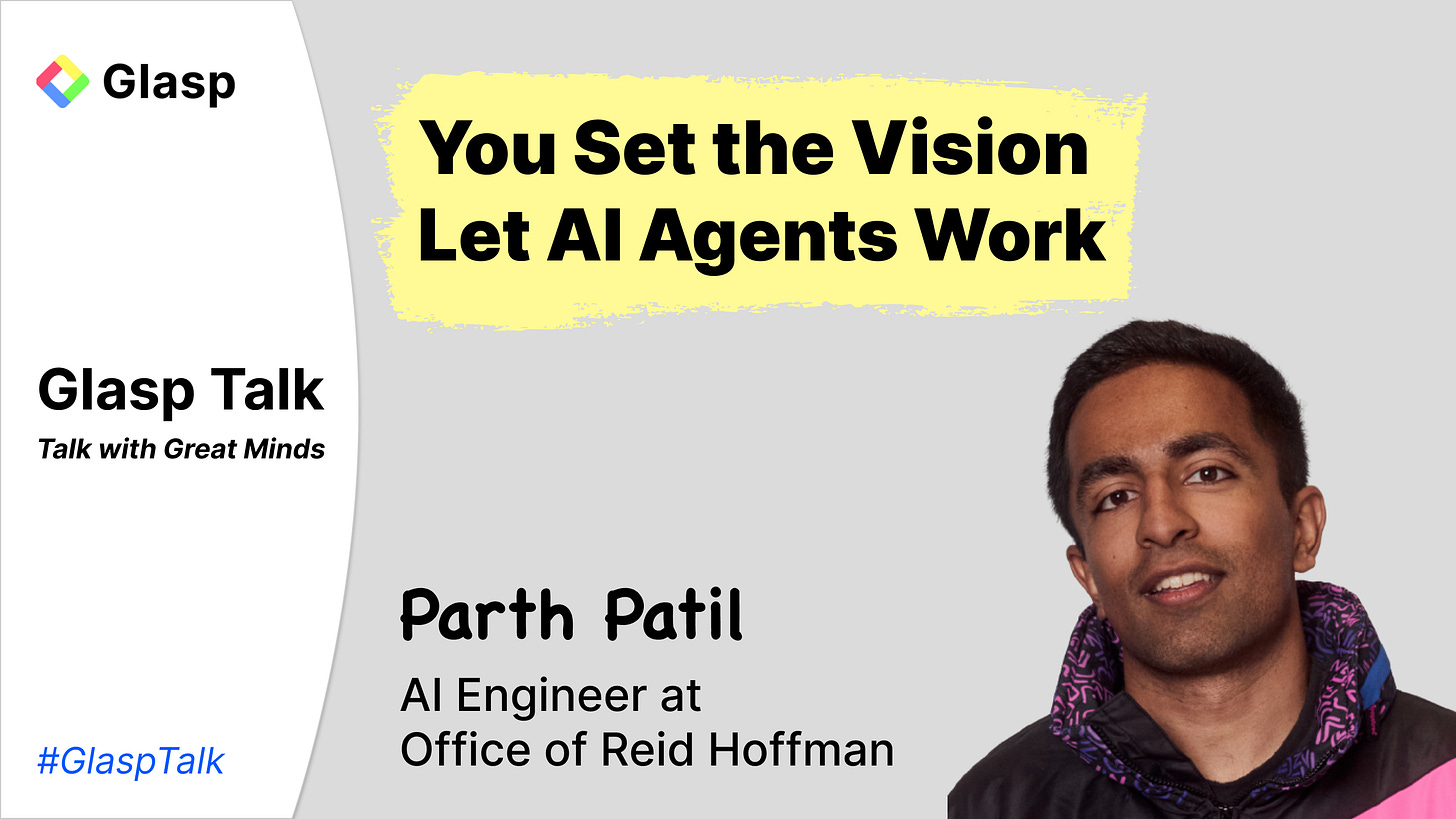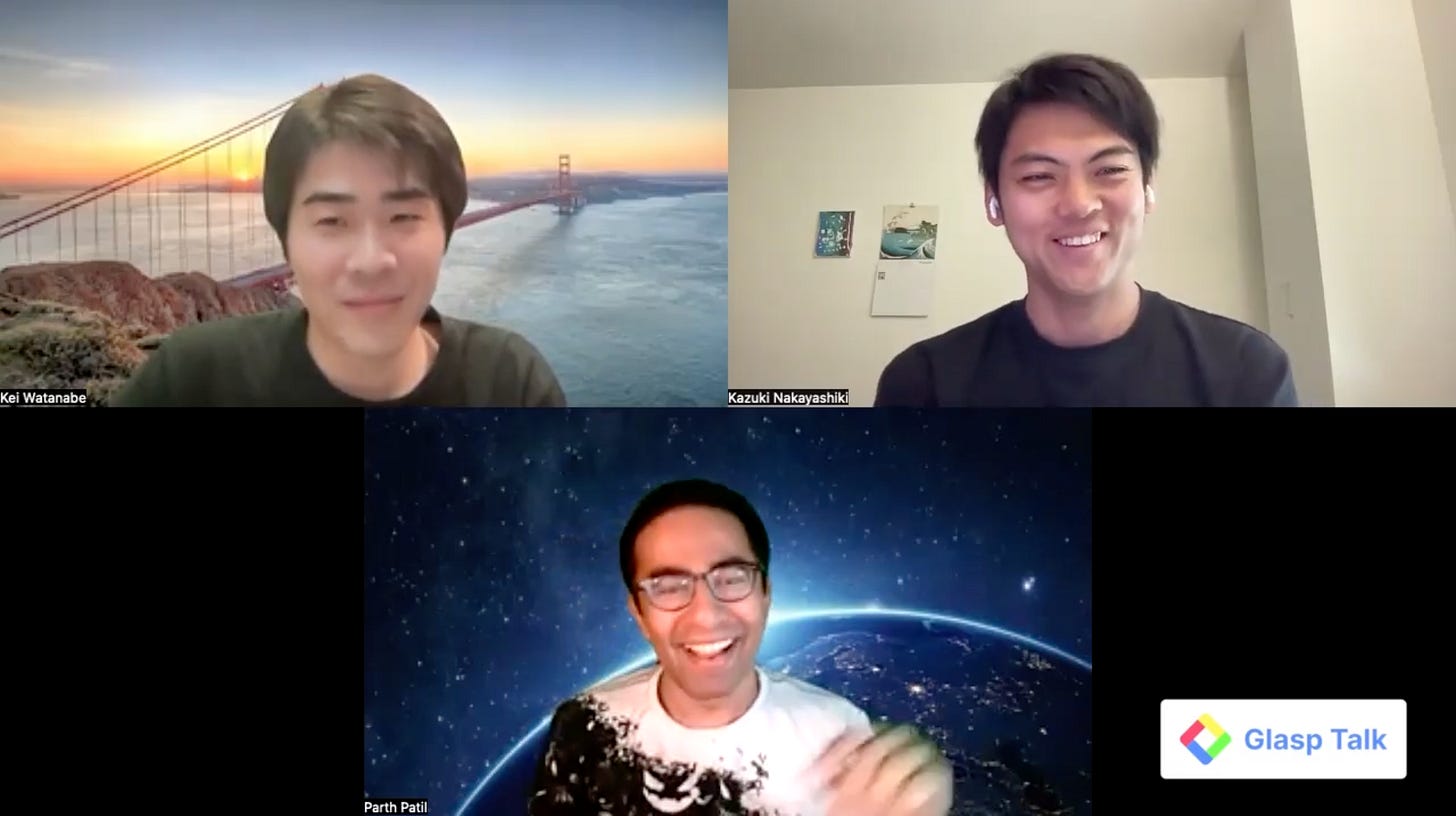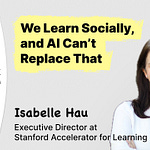This is the sixtieth session of Glasp Talk.
Glasp Talk delves into intimate interviews with luminaries from various fields, unraveling their genuine emotions, experiences, and the stories behind them.
Today’s guest is Parth Patil, an AI engineer, innovator, and technical advisor driving the future of AI agents and compositional software. Parth has worked at the cutting edge of generative AI, from building research automation systems and chatbot frameworks to teaching thousands of learners worldwide through Coursera. He previously worked at Clubhouse and is now shaping AI agent development alongside the Office of Reid Hoffman, where he famously built "Reid AI," an AI clone of the LinkedIn co-founder that sparked global conversations about identity and intelligence in the age of AI.
Watch the full episode on YouTube
Watch now on YouTube, Apple, and Spotify.
We talked:
(11:11) Why AI-assisted coding is the future of software development
(29:37) Training AI on personal game history to capture user preferences
(30:38) Defining the social and business value of AI clones in future tech use cases
(47:23) Using Graph-RAG to handle complex queries and track evolving user preferences
(1:00:11) The overlooked power of structured outputs in language models (e.g., JSON, data extraction)
(1:17:38) The critical problem of verifying authenticity in the AI era (provenance & blockchain)
(1:31:13) Building “network intelligence” through conversations, diverse communities, and creativity
(1:45:29) Brain–AI interfaces and the future of personal memory augmentation
Get a quick overview & summary
✨ Want a concise summary before diving in? Install the YouTube Summary with ChatGPT extension by Glasp for instant video summaries!
Highlights
From AI Tools to Agentic Thinking
Parth Patil shares his evolution from building traditional AI tools to exploring the frontier of agentic software. His early work focused on automating tasks like research and prototyping, but over time, he shifted toward designing systems that not only execute commands but also make decisions and evolve. Now working with Reid Hoffman, he is shaping how autonomous agents can collaborate, reason, and build systems alongside humans.
Vibe Coding and Modular Co-Creation
Introducing the concept of "vibe coding," Parth explains a new approach to software development where intuition and iteration replace strict specifications. Developers guide agents through high-level goals, letting the system generate components and improve them over time. This modular, improvisational workflow accelerates prototyping and unlocks creative potential, making software development more accessible and expressive.
Rethinking Learning and Human-AI Collaboration
Parth emphasizes that the real opportunity in AI lies not in replacement but in transformation. He envisions a future where agents help humans think, build, and learn in new ways. With AI handling repetitive work, people can focus on higher-order creativity and systems thinking. This shift demands a new kind of education—one that teaches how to collaborate with machines and design intelligent workflows, not just write code.
Transcripts of YouTube
I realized a lot of stuff is a lot easier now. Now you can do in three hours what used to take three years, and that means that we have to be more ambitious, more creative, and more optimistic too. We have to make the future that we want to live in, and so like you have a chance to be a part of making that future. Hi everyone, welcome back to another episode of Glasp Talk. Today, we are excited to have Parth Patil with us. Parth is an AI engineer and… Read more
Key questions & insights
Q: What inspired Parth Patil to focus on autonomous agents rather than traditional AI tools?
Parth began by building AI-powered utilities for research, content generation, and automation. However, he realized that their fixed outputs and reactive behavior limited traditional tools. His curiosity led him to explore agents that could reason, take initiative, and evolve. Inspired by frameworks like BabyAGI and LangChain, he now focuses on building modular, composable systems that act more like collaborators than tools.
Q: What is “vibe coding,” and how does it change how software is built?
"Vibe coding" refers to a collaborative, improvisational approach to software creation. Instead of writing code line by line, developers provide high-level goals or constraints. The agent then suggests, refines, and adapts solutions in real time. This workflow prioritizes intuition, iteration, and co-creation, allowing users to build faster without being constrained by rigid specifications. It represents a shift toward ambient, conversational software development.
Q: How does Parth envision the future of human-AI collaboration?
Parth believes that AI’s greatest potential lies in enabling new cognitive workflows. Rather than replacing humans, agents will augment thinking, planning, and system design. He emphasizes a future where humans and agents operate in symbiotic loops, sharing context, delegating tasks, and learning together. This shift requires rethinking productivity, education, and even identity, as humans learn to collaborate with intelligent agents as thought partners.
Q: What kind of tools and frameworks does Parth use to prototype agentic systems?
Parth frequently uses tools like Replit for fast iteration, Airtable for structured knowledge storage, and LangGraph or custom frameworks to orchestrate agent behavior. He designs agents to be modular and composable, treating them as building blocks for larger workflows. His emphasis is on transparency, interoperability, and lightweight experimentation to enable fast, adaptable development cycles.
Q: What advice does Parth offer to builders entering the AI agent space?
He encourages builders to think in terms of systems, not just apps. Start with problems that benefit from continuous interaction and context retention. Don’t be afraid to launch imperfect prototypes and let them evolve. Parth stresses the importance of open-source collaboration, shared standards, and a mindset of curiosity. In his view, the future will be shaped by those who build with agents, not just for them.
Follow Parth Patil on social
Partner with Glasp
We currently offer newsletter sponsorships. If you have a product, event, or service you’d like to share with our community of learning enthusiasts, sponsor an edition of our newsletter to reach engaged readers.
We value your feedback
We’d love to hear your thoughts and invite you to our short survey.















